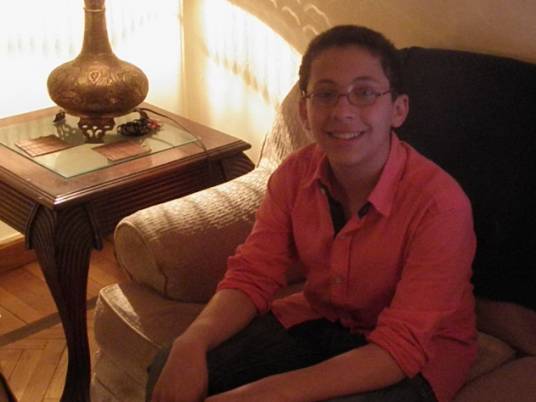
He was sponsored by Microsoft to complete a series of certificates in computer programming. He is one of the youngest people on the planet qualified to instruct university graduates in the programming language C++.
And he is only 14.
But after a few minutes sitting with Mahmoud Wael, it becomes clear that these accomplishments, while compelling, are not a particularly miraculous feat, given the story of his life.
Wael is, literally, a genius, with an IQ of 155, according to the Stanford-Binet intelligence scale. Born in Cairo in the middle-class neighborhood of Hadayeq al-Qobba on 1 January 1999, Wael has been in the public eye, nationally and internationally, since he was about 3 years old.
For readers familiar with intensive computer programming, the notion of a 14-year-old being qualified to teach C++ may be hard to digest. Who is this kid who can teach master’s courses that few people on the planet, let alone in Egypt, can even pass?
Baffled by this knowledge — as well as my own inability to comprehend C++ at the age of 28, even after completing a master’s in physics that included several courses on the programming language — I invited Wael and his father, who accompanies him everywhere, over to dinner.
Wael’s father, Wael Mahmoud, is a pediatrician. He explains that he was trying to teach multiplication to Wael’s older sister, Abela, who was 6 years old at the time and was finding the multiplication tables extremely difficult.
Three-year-old Wael wandered into the room and began reciting all the answers, Mahmoud says. At the time, Wael could barely talk, let alone understand the concept of a number, as he hadn’t yet been to kindergarten.
After going through the entire multiplications sheet — all the way to 12 times 12 — his father ran to the boy’s mother, exclaiming, “A genius! Our boy is a genius! Watch, he knows the whole chart!”
His mother, a biology teacher, brushed off the seemingly exaggerated claim, believing Wael’s number skill to be some kind of weird fluke. But news of the boy’s ability spread quickly, and, within months, news channels were asking Wael to demonstrate his amazing abilities with numbers, bringing him to the attention of the public eye.
Curious about this, I ask Wael whether he can still multiply like he used to.
“I guess so,” he replies.
“OK, then what’s 136 times 141?” I ask.
Wael repeats the numbers in English once, mumbles to himself in Arabic for about four seconds, and then answers: “19,176.”
I pull out my calculator. Case closed.
Wael’s early interviews led mathematicians and psychiatrists to contact his family about giving the boy an IQ test, which he took at age 4. The following year, Wael entered the Egyptian public school system, but, by this time, schools were offering him scholarships left and right, so he was soon moved to Green Land International School, accredited to offer International Baccalaureate courses.
Yet still, Wael was light years away from his peers, who were just starting to learn what 1 plus 1 was.
Despite being a mathematical genius, Wael comprehended English like an above-average 6-year-old. At age 7, the American University in Cairo offered to provide him English courses to allow him to read books to get deeper into theoretical math.
It took Wael three months to learn how to read, write and speak English, and he was even becoming proficient in French. Wael shyly admits he could probably learn any language in about the same time, if he had a good enough reason to.
But during this stint at AUC, another talent of Wael’s was soon recognized: programming. Wael could understand what was going on in the computer science classes he walked past on his way to his English courses.
It didn’t take long for this to receive global attention from the likes of Microsoft. Soon, Ahmed Zewail, winner of the Nobel Prize in chemistry, stepped in, offering the young genius personal advice on advancing his career.
Wael explains that the best piece of advice Zewail gave him was to try and live a normal life and be as well-rounded as possible. Zewail said he once saw a brilliant, science-minded boy lose his mind by neglecting all other academic subjects.
Wael seems to have taken this advice to heart. Nonetheless, he stayed at Green Land International School and aced his classes while advancing himself during his own time, as well as at AUC, where Microsoft sponsored him to take programming courses.
At first, Wael says, other students were not kind to the kid who was better than them at every subject, including English, having learned in three months what others took years to learn. But he says acceptance soon replaced animosity, and he is now treated “just like any other normal boy.”
Tellingly, Wael uses the expression often during our meeting — not something a “normal boy” usually insists upon.
After completing the Cisco Certified Network Associate, Cisco Certified Network Professional and Cisco Certified Internetwork Expert certificates, Wael is now qualified to teach university graduates.
He still rides the bus to school every day, plays football with friends on the weekend and likes to read Roald Dahl’s books, but says William Golding’s novel “Lord of the Flies” is one of his favorite books to date. It is clear Wael is set on trying to remain as focused, grounded and ‘normal’ as possible, despite the tumultuous nature of his life and all the attention it brings.
At age 11, he says, the education minister called him to explain that Wael could go to university the following year if he wanted, but he turned the offer down, wanting to continue to grow with the other kids.
When asked if Wael possesses any other unique skills, he says he can multitask exceptionally well. He can listen to television, write computer programs and talk to his mother simultaneously, giving each task equal focus.
Wael seems keen to consistently downplay his abilities, quickly finishing off any sentences that may hint at his above-average intelligence by saying, “and so on, and so on … .” One minute, he discusses his desire to win the Nobel Prize and how he writes programs in his spare time; the next, he’s shyly looking at the floor, asking where the bathroom is.
When asked about his views on the 25 January revolution, Wael states his support.
“Obviously I am for it, but I do not like what is happening now, nor how people are pointing fingers at individuals to blame,” he says. “But I think if everyone learned to respect themselves and focus on doing their own jobs properly and respecting the rights of others, the country would function properly.”
Wael says he is absolutely dedicated to remaining in Egypt, and to ensure that any innovations, inventions or patents he makes are put on the Egyptian map and not given to anybody else.
I ask him whether he thinks Egypt has the institutions and capacity to push Wael to his highest level.
“Basically, I will take my education in Egypt until I finish high school or reach a ceiling at a university,” he says. “Then, I might travel abroad, or maybe not, to further my education.”
But even if he does study abroad, he says he has made it clear to Zewail and universities abroad that have offered him scholarships — which he has turned down — that anything new he does or creates would be attributed to Egypt. He says thus far, he has no specific ideas yet, but that his goal is to win a Nobel Prize.
Despite there being no Nobel Prize for programming, Wael explains that “it is easy to find a way to attribute aspects of programming to the different award categories.”
Egypt may be very lucky to have given birth to this patriotic genius — or perhaps Wael is lucky to have been born in and devoted to Egypt. Time will tell.
This piece was originally published in Egypt Independent's weekly print edition.

